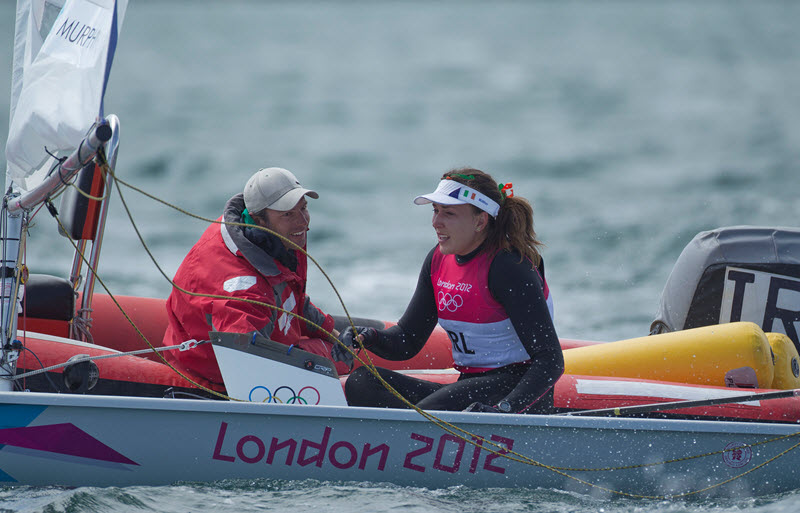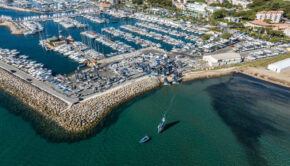Olympic History: Sudden Death Sailing
Published on July 22nd, 2016
by Fi Edwards, World Sailing
London 2012 was the first time the Olympic Games had returned to British shores since 1948. Even the famously grey weather seemed to be on board as the greatest show on earth touched down in gloriously British style.
The crowds had arrived early, flocking to the packed spectator area on the Nothe to enjoy a day of spectacular sailing in the baking sunshine.
The mood on the grassy bank overlooking the sailing area was still electric following the drama of ‘Super Sunday’; the day that had delivered Ben Ainslie’s (GBR) historic fourth gold medal in the Finn and a climatic showdown between the British, Brazilians and the Swedish in the Star. Now the anticipation was high for the second day of Medal Races in the waters off of Weymouth and Portland. Sailing, as always would not disappoint.
Top of the bill was the Laser Radial. The athletic and highly competitive women’s one-person dinghy had instantly engaged audiences on its Olympic debut four years previously in Beijing. Racing was always notoriously close but the 2012 Olympic Sailing Competition would be even closer still, coming down to a final shootout between the top four sailors for the coveted gold medal.
Four formidably talented women had battled it out on the Weymouth waves, and now barring catastrophe, only three would win medals. It was now the Medal Race, and one would go home in the cruellest position of all – fourth place. This would be sudden death sailing.
As they lined up on the start lines the cameras picked them out. China’s Lijia Xu, the regatta leader and bronze medallist from the Beijing Games. Annalise Murphy, the strong wind specialist from Ireland who had been leader at the midpoint of the Olympic Sailing Competition. Evi Van Acker, the Belgian all-rounder who had put in a consistent performance, never dropping out of the top three. Marit Bouwmeester of the Netherlands, the 2011 World Champion and a force to be reckoned with.
And then the start gun went. Murphy and Bouwmeester got off well, using their strength to power them upwind to the favoured left side. Knowing she was at a disadvantage to her bigger, stronger rivals Xu took a risk; heading to the right towards the crowds on the Nothe. Murphy started to pull out a lead, once again asserting the dominance that had seen her win the first four races.
But Murphy’s position wasn’t to last as half way up the beat the wind shifted – Xu’s big risk had paid spectacularly and the Chinese sailor glided across the fleet. But to catch the breeze which had swept her up the fleet Xu had missed her layline, she would have to tack. Murphy slipped past her, first round the first mark, Xu second and Bouwmeester fourth behind Great Britain’s Alison Young.
Xu powered down the downwind stretch to overtake the early leader. Her blistering speed downwind no surprise to those who had been watching the earlier races. This time though the pressure would start to show. As Xu pulled away from the fleet the umpire signalled a penalty under Rule 42 – too much rocking and pumping.
Xu’s infringement had handed the advantage back to her rivals. But instead of increasing her nerves the penalty would focus her. She executed textbook penalty turns and continued with her race unshaken. First place recovered before the fleet rounded the next mark.
Murphy struggled downwind, the breeze not quite enough to overcome her weight disadvantage over the other three. Behind her Bouwmeester could smell blood. She finessed her way past her Irish rival and in to the silver medal position. Unwilling to give up the hunt Murphy came back on the upwind, rounding the third mark in second behind Xu.
Again Bouwmeester pushed forward on the downwind and again Murphy, hampered by her extra size, slipped back into the fleet then battled back up upwind. This time the girl from Rathfarnham would not take her rival on the beat. Rounding the top mark for the final time it was Xu, Bouwmeester then Murphy. And that was that, or so the commentators thought as the leaders started off downwind.
Van Acker though would not give up on a podium without a fight. As the top three surfed down the waves she worked her boat hard to catch up. The Belgian who had performed so well all week pulled herself from eighth to fourth on the final leg and then, in a crushing blow, to third. Just like that the bronze medal slipped from Murphy’s fingertips.
Xu crossed the line comfortably in first place, Bouwmeester behind her and then Van Acker. Gold, Silver and Bronze. Elation from the Chinese, Dutch and Belgian fans on the Nothe and shock and heartbreak for the Irish, only moments ago so assured of a medal.
For Xu, Bouwmeester and Van Acker elation; for Murphy, bitter disappointment. To lose not just a Gold medal but any medal at all, to have it slip through your fingers in the final minutes is cruel beyond comprehension. She slumped, broken, in her boat to be towed to the shore and tearfully into the arms of her team.
That was four years ago. At the Rio Games in August, a different cauldron will be lit and round two will kick off. Bouwmeester and Van Acker have dominated the Radial, they will be in the mix. Xu returned from retirement last year to defend her gold. Murphy, she will be there too; more present than she was in London, hungrier, seeking the retribution.
The blow of falling off the podium in London 2012 has taught Murphy resilience. She’s worked for four years to correct the weaknesses of London, now, as she puts it, “There’ just China, Holland, Belgium, Britain and the rest to beat.”










 We’ll keep your information safe.
We’ll keep your information safe.